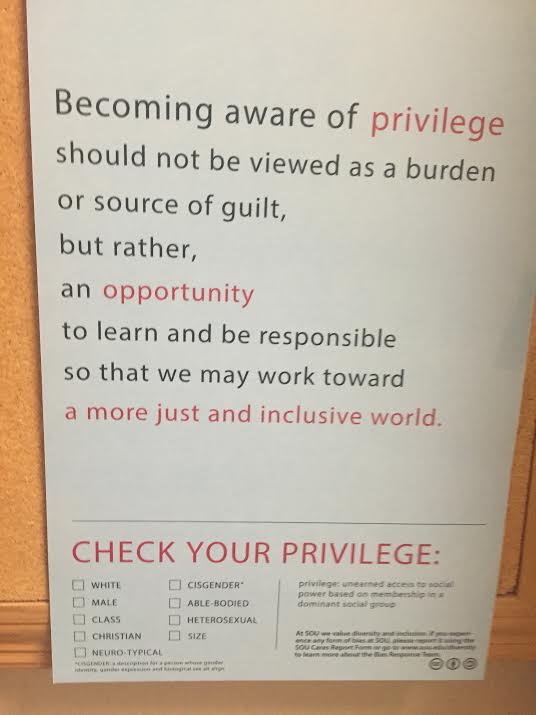
Posters asking anyone on the Southern Oregon University campus to check their privilege sparked controversy and dialogue. The Bias Response Committee campaign posters appeared all over campus with different boxes checked about what privilege you may have.
As a result of the campaign SOU Cares noted an increase in students needing to talk, the posters became fodder for many discussions, some difficult. So the Response Team decided to have public meetings for students to air their feelings. Students met in the Stevenson Union on Feb. 4, to have a spirited, albeit respectful, conversation on how the posters affected them.
“(We wanted) to provide awareness that privilege does exist, and explain that privilege does not just pertain to race but that there are other forms of privilege, we wanted to start a dialogue..and I would say we succeeded,” said SOU Associate Director of Student Life – Diversity and Inclusion Marjorie Trueblood-Gamble. The blue and black posters, which can be seen all around campus, described certain situations where a person with privilege can realize the opportunities they have over other groups, and asked students to look at their own identities with a critical eye. The privileges discussed have not been limited to white privilege, as the posters have touched on topics ranging from, dealing with the police, class, mental health, body image, sexual orientation and gender privileges to name a few.
“The fact that we had a diverse showing of people at the conversation on Thursday was a marker of success,” said Trueblood-Gamble, “I think it’s really easy to put on an event and have the proverbial choir show up. So to have an event where people with different perspectives attend is great.”
The posters certainly have started a dialogue among students, some who express feelings of alienated by the campaign. “I believe they are segregating and dividing the population by targeting certain groups,” said SOU student and U.S. Marine corps. veteran Tim Short. “I don’t see why we have to divide people up into separate groups,” Short continued.

Trueblood Gamble explains that the purpose of the posters was not to alienate any students, or to make anyone feel guilty about their identity. “The differences that we analyzed are just one aspect of people’s identities, now it doesn’t mean that because you have this identity it trumps the other ways that you might be marginalized. Its just to be aware that you may have advantages that other people don’t, and to hopefully break down barriers and make people more empathetic with others,” she explained.
“The minute someone else feels uncomfortable we have to shut it down. So then I don’t get to talk about this outside
of my group of friends who have the same issues,” said SOU student Emil Nance. The posters themselves are based off of a template previously used by the University of San Francisco. While the Bias Response Team did choose which posters to use at SOU, some students have voiced concerns that the posters are not tailor made for the SOU community. “I feel like it’s trying to create a micro solution for a macro problem,” responded Short.
Conversations on privilege and the posters themselves will be an ongoing topic at SOU, if you wish to have your voice heard a second talk concerning privilege and the poster campaign will be held Thursday Feb. 8 at the divergence room in the Stevenson Union.
